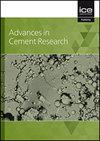应用生物矿化技术提高稻壳灰掺合混凝土的界面性能
IF 1.4
4区 工程技术
Q3 CONSTRUCTION & BUILDING TECHNOLOGY
引用次数: 0
摘要
本研究全面探讨了如何应用生物水泥化技术提高以稻壳灰(RHA)为辅助胶凝材料(SCM)的混凝土性能。稻壳灰具有很大的用作胶凝材料的潜力,因为它的二氧化硅含量很高,最终会与钙和水反应形成 C-S-H 凝胶,从而提高胶凝材料的强度。然而,使用高剂量的 RHA 会导致混凝土强度降低,因为过量的二氧化硅会与 Ca(OH)2 发生反应,在混凝土基质中形成二氧化硅团块,从而减少混凝土成分中的粘结力,造成微裂缝。因此,为了缓解这一问题,我们采用了酶诱导碳酸钙沉淀(EICCP)工艺来处理微裂缝,并提高 RHA 混凝土的机械性能和耐久性能。结果表明,EICCP 工艺提高了各替代等级混合料的强度,10% 的替代等级表现出最佳效果。抗压强度提高了近 29%。与对照试样相比,这种混合料的耐久性也有所提高。由于混凝土在体现碳足迹中占了很大一部分,因此使用像 "实验混合料 "这样的绿色混凝土混合料有可能大大减少建筑碳足迹。本文章由计算机程序翻译,如有差异,请以英文原文为准。
Application of biomineralization for enhancement of interfacial properties of rice husk ash blended concrete
The present study is comprehensive research on application of biocementation for enhancing the properties of concrete having rice husk ash (RHA) as a supplementary cementitious material (SCM). RHA has a large potential to be used as SCM because it has high silica content which eventually forms C-S-H gel by reacting with calcium and water, which increases strength of the cementitious material. However, using high doses of RHA causes a decrease in concrete strength because excessive silica is available to react with Ca(OH)2, forming silica clumps within the concrete matrix, which reduce the bonds within the concrete constituents causing micro cracks. Hence to mitigate this problem, enzyme induced calcium carbonate precipitation (EICCP) process was used to treat the micro cracks, and enhance the mechanical and durability properties of RHA blended concrete. Results showed that EICCP process enhanced the strength of the mix at each replacement level and 10% replacement level exhibited optimum results. With nearly 29% increment in compressive strength. This mix also exhibited enhanced durability as compared to the control specimens. Since concrete constitutes a significant portion of embodied carbon footprint, using greener concrete mixes like “Experimental Mix” has the potential to considerably decrease the carbon footprint of construction.
求助全文
通过发布文献求助,成功后即可免费获取论文全文。
去求助
来源期刊

Advances in Cement Research
工程技术-材料科学:综合
CiteScore
3.70
自引率
5.00%
发文量
56
审稿时长
3.2 months
期刊介绍:
Advances in Cement Research highlights the scientific ideas and innovations within the cutting-edge cement manufacture industry. It is a global journal with a scope encompassing cement manufacture and materials, properties and durability of cementitious materials and systems, hydration, interaction of cement with other materials, analysis and testing, special cements and applications.
 求助内容:
求助内容: 应助结果提醒方式:
应助结果提醒方式:


